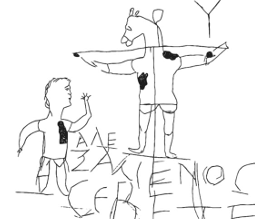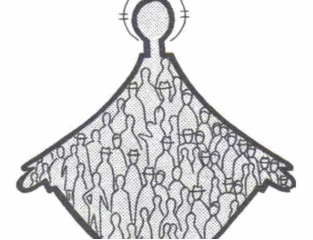God’s Demand for Reconciliation
These are intense and anxious times and we long for a sense of family and communal healing and cohesion. We struggle to know where, and how, to bring some sanity into our many broken relationships.
A story is told about two warring congregations that were once were one. An intense argument ensued that caused the congregation to split. One Sunday a faction of the congregation came to church with guns in hand. The pastor and his faction fed. The pastor purchased a piece of land and built a church building by himself, assuring that he and his small contingent would never have to deal with the other group again . . . and the never did. No desire to get to a place to accept each other as brothers and sisters.
That’s not where we are as a congregation; but, there are hurts, pain and separation in the congregation. It’s not necessarily among people here; but, external pain and separation that has an effect on all of us.
You see, we all can agree that we are all God’s children worthy of respect and protection. Attitudes and actions of superiority of any kind have no place among God’s people. Where we might disagree is to what degree does this play in our daily lives, in racial and ethnic disparities. We accept that there is the disparity but we probably have different opinions for the reasons.
We probably agree that Christ’s church should not be beholden to a specific political party. And we probably agree that the church shouldn’t be silent. That being said, we all don’t agree how our spirituality and moral convictions should apply to that engagement. We all will say, “Let the main thing, be the main thing”. The problem is, we can’t agree on what’s the main thing!
We agree that we are the ones who are responsible for the issues we face. That our Holy Scriptures call us to be honest about how we treat each other. The problem is we just can’t, or won’t get a handle on who and what causes the problems we face. We point fingers at the other person, not ready for self-examination.
There are many other areas of agreement/disagreement that we can talk about. But for the moment, let’s let these be the touch stone for continuing our processing.
There are fault lines among many who claim Jesus as their leader. We have lost our desire for civility. In this painful and distrustful atmosphere, we ask if we can ever be reconciled . . . not just tolerate each other or compromise. We seek true reconciliation because it is, at its core, a process of transformation for both sides in a conflict.
Sunday mornings becomes a place for respite from the hurt and pain of our brokenness. Here we might find some answers.
For us, reconciliation carries with it the biblical command. The Gospel of Micah is a good place for me to begin.
In the midst of community upheaval, violence, mistrust, Micah posed a critical question to the
Judean people: What does God expect (or require) of God’s people? There was a need for reconciliation. There were economic exploitation by powerful people. They resorted to oppressive tactics to subjugate the weak. Yes, there was violence in the land . . . physical, and psychological and emotional. Communal ties had been broken and families were often at odds. No peace! There was a need for redemption and reconciliation.
This question Micah posed troubled peace seekers then and it troubles us now.
The answer was clear: do justice, love kindness, and walk humbly with God (Micah 6:8). We understand the first two pieces of advice . . . love neighbor. What about walking humbly? To walk humbly asks us to be introspective, self-giving and sacrificial. We empty ourselves that that the God within can be revealed. It’s being open to God’s truth no matter where it comes from.
I can almost hear Micah speaking to us today because we are at somewhat the same state that the Judean nation found themselves in . . . divided and needing redemption, restoration and reconciliation. He’s saying loudly, here’s what God requires of you. We know the scripture because we have heard it many times . . . be just, love your neighbor and walk with God . . . not just walk, but do it sacrificially! What he was pointing to was the need to become a reconciled people. First, to self, then to each other and finally to God.
That’s a tall order!
As Christ centered people, reconciliation should be our end goal. Our Holy Scriptures, teaches that God has given us the message of reconciliation. (2 Corinthians 5:-20b). Bitterness isn’t an option. We’re working out our lives together. I need you to forgive me when I sin against you, and I must forgive you as well because God has forgiven us in Christ
We often think that forgiveness and reconciliation are the same. We say, “I’ve forgiven him/her/them. Why don’t they just get over it and let’s move on?” Forgiveness is a prerequisite for reconciliation, but it’s not reconciliation. We often use Matthew 5:23-24 as a way toward reconciliation. But, I submit that Jesus is talking about seeking the forgiveness of the other rather than forgiving others. It is only when we seek that forgiveness from others can we truly begin to experience a relationship that leads to reconciliation. Reconciliation requires profound repentance. But there must be remorse as an initial step that begins with forgiveness. True reconciliation can only happen, when the warring people understand each other in ways that
causes them to behaving differently.
This doesn’t mean we must immediately trust them. Estranged relationships destroys trust and it takes time to heal. Healing requires dealing with the consequences of our actions.
Healing doesn’t begin with our strategies. It’s a personal journey that recognizes that the God within us desires healing for us. It’s restoring relationships to how our Creator intended. We must live into the reality that reconciliation is both “already” and “not yet”. We are stepping into a story that has not yet been written. Each of the actors have an unwritten part and it allows our dialogue to be created. We have the desire, need I say, the need to interrupt the brokenness.
The world ask how can we fix it. We are followers of the Third Way, and as painful as it might be, we seek a deeper understanding of the truth that begins with us asking, “Where are well and how did we get here?” It’s painful because we are posed with dealing with the simple act of caring for the other just as much as we care for ourselves. We seek the spiritual resources beyond ourselves and ask for the God within and outside of us for guidance. The God outside of us is found among us . . . hearing and offering God’s healing care.
Reconciliation is hard! It’s hard because we fear that something has to give and it won’t be from me. Sacrificing is hard and it maybe our opinion about ourselves and others need to change. All of us hold on to some belief that is dear to our hearts. It is either we hold on to that which we think is truth or acquiesce and embrace the opposing view. That’s a hard choice!
We all have part of God’s truth and we articulate our views of truth while creating space for other views.
As a regional pastor, I was often confronted with either you or right or wrong. I would often ask people to answer three questions: Do they believe that God exist in everyone? Do they believe that God is truth? The answer was always “Yes”. My response was, “If that’s your belief, then all of us have a piece of the truth and worthy of being considered”. It’s not they had to change; but, be open to change by trying to understand the other’s truth. That’s “calling in’ rather than “calling out”. To me, that’s the beginning of becoming a reconciled people toward a reconciled community!
One thing we like at Shalom is singing . . . and we do it fairly well. When we organize ourselves as a choir, all of us have a part . . . alto, tenor, soprano, and base. Some like me, sing counter tenor and don’t know where our voice fits in. I’m lost and looking for directions. Those of us who have an understanding of musical notations take time to give counsel about the notes to sing so there is a reconciled melody.
The same is true about reconciliation, we are a voice conductor for each other . . . helping each other reconcile our lives with other. I pray that we may be the choir (master/mistress) for each other as we seek to be agents of reconciliation.
As I close, I want to leave these word by Alan Paton, South African author & anti-apartheid activist, for you to consider as you seek to be a truth teller and reconciler. He said. “It is not ‘forgive and forget’ as if nothing wrong had ever happened, but ‘forgive and go forward, building on the mistakes of the past and the energy generated by reconciliation to create a new future.”
So, what does God demand of us so that God’s redemption and reconciliation can happen?
Just this: . . . do justice, love kindness, and walk humbly with your God
May it be so with all of us!



0 Comments